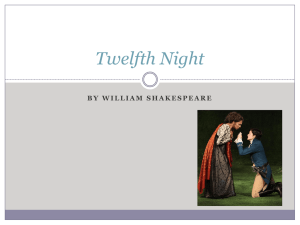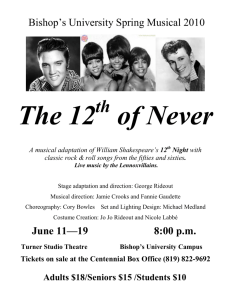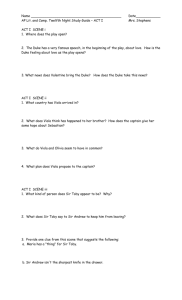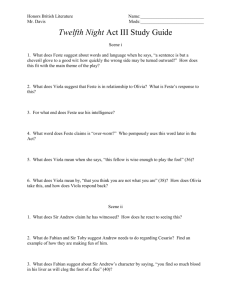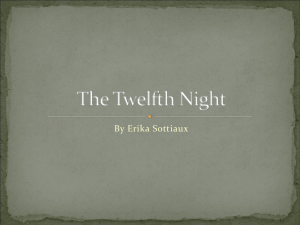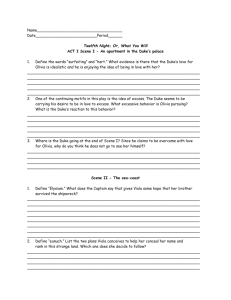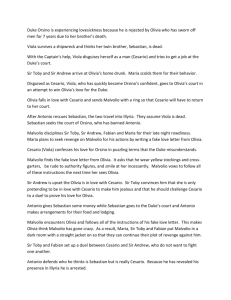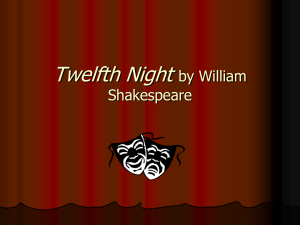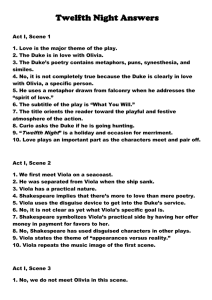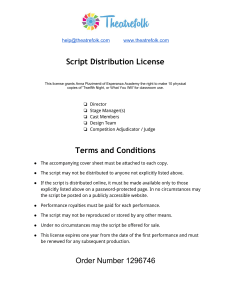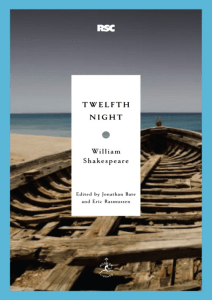Twelfth Night - Chisholm Academy
advertisement
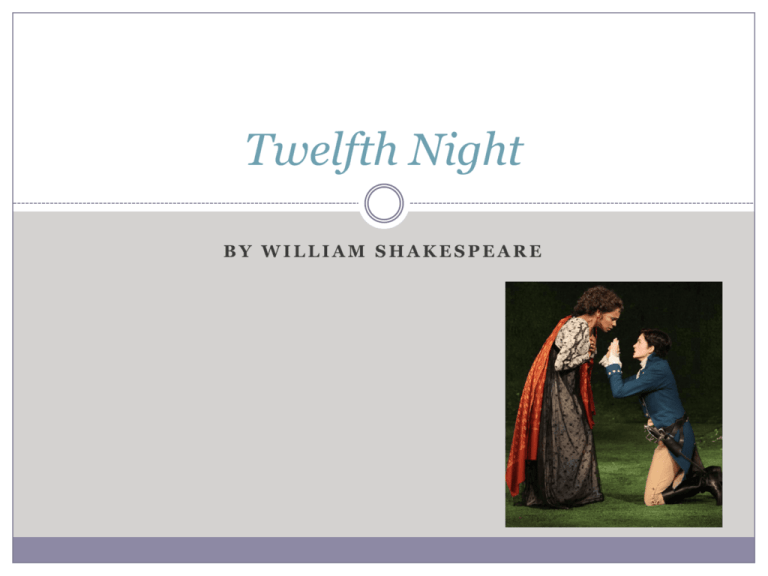
Twelfth Night BY WILLIAM SHAKESPEARE William Shakespeare: Bare Bones Biography He was born in 1564 in Stratford-on-Avon and died in 1616. He is arguably the most admired author of all time. The only known education he received was grammar school He married Anne Hathaway who was 9 years his senior. While he had three children, his son Hamnet died at a young age (possibly from the plague). Shakespeare gained a reputation as an actor, playwright and poet and was the co-owner of The Globe Theatre in London. Because of the plague, the London theatres closed from 15921594. Thus, Shakespeare wrote 154 sonnets during this time. Historical Context The basic plot of TN is not original to Shakespeare. This play was inspired by several Italian comedies that appeared in the decades prior to TN’s first performance. The theatre was an integral part to life in Elizabethan England. The Globe Theatre seated 3,000 spectators of all classes Groundlings paid 1 penny for admission– their entire day’s wage! William Shakespeare’s plays had universal appeal among all classes in Elizabethan England. The Globe Theatre Elizabethan Comedy A genre named for Queen Elizabeth I, the ruling monarch during Shakespeare’s time. Elizabethan comedies included the following conventions: A lighthearted tone Mistaken identities Multiple plot lines Frequent use of puns A clever “fool” or servant A conflict between propriety and debauchery Young lovers who overcome obstacles to their relationship A happy ending that includes marriages, reconciliations, and reunions. Characters Orsino, Duke of Illyria: Loves Olivia; loved by Viola Lady Olivia: A rich countess; loved one of the Duke; loves Viola (as Cesario) Viola: Twin sister of Sebastian; Cesario; page to Lady Olivia; loves the Duke Characters Sebastian: Twin brother of Viola; Roderigo; one who is confused with his twin sister (as Cesario) Sir Toby Belch: Olivia’s uncle; a drunkard; coconspirator with Sir Andrew, Feste, and Maria Sir Andrew Auguecheek: Suitor for Olivia’s hand in marriage; a foolish man; co-conspirator with Sir Toby, Maria, and Feste Characters Feste: Clown; co-conspirator with Sir Toby, Sir Andrew, and Maria; occasional commentator on what is happening Malvolio: Olivia’s steward (Manager of Estate); a vain and pompous man; object of the conspiracy to humiliate him Maria: Servant of Olivia; co-conspirator with Sir Toby, Sir Andrew, and Feste Characters Sea Captain: Friend of Viola Valentine and Curio: Aristocrats in Olivia’s court Fabian: An aristocrat in the Duke’s court Major Themes Appearances do not always reflect reality. Role playing is a part of social life. Love often resembles madness. Motifs : A Reoccurring Idea in a Work of Literature Fools/Madness Deceptions/Illusions Role-playing/Disguises Inversion of Normal Order The Fleeting Nature of love and beauty Concealed love Letters/Messages Figurative Language & Literary Devices Metaphors “If music be the food of love, play on.” Similes “Like Arion on the dolphin’s back” Personification “words are very rascals” Allusion: a reference to a person, place, myth, event which is not part of the story, but the reader is expected to recognize. Figurative Language & Literary Devices Paradox: a statement that appears contradictory but contains truth. “Than love that would seem hid: love’s night is noon.” Oxymoron: A term or phrase that is apparently self-contradictory. “sweet pangs” Verbal Irony: a discrepancy between what is said and what is really meant. Pun: an expression that utilizes two distinct definitions of the same word or phrase to achieve emphasis or humor. Dramatic Conventions and Techniques Conflict: external & internal Soliloquy: A speech delivered by a character while alone on stage. Provides insight into the character’s thoughts, emotions, and motives. Aside: words spoken by a character on stage that are meant to be heard by the audience only. Situational Irony: when a situation has results contrary to those expected. Dramatic Irony: when the audience is aware of something the characters don’t know.
